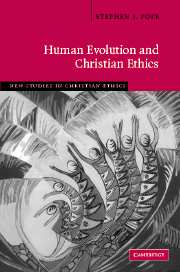Book contents
- Frontmatter
- Contents
- General editor's preface
- Acknowledgments
- Introduction
- Chapter 1 Evolution and religion
- Chapter 2 The indifference of Christian ethics to human evolution
- Chapter 3 Varieties of reductionism
- Chapter 4 Faith, creation, and evolution
- Chapter 5 Chance and purpose in evolution
- Chapter 6 Human nature and human flourishing
- Chapter 7 Freedom and responsibility
- Chapter 8 Human dignity and common descent
- Chapter 9 Christian love and evolutionary altruism
- Chapter 10 The natural roots of morality
- Chapter 11 Natural law in an evolutionary context
- Chapter 12 Sex, marriage, and family
- Bibliography
- Index of scriptural citations
- Index of names and subjects
Chapter 3 - Varieties of reductionism
Published online by Cambridge University Press: 26 June 2009
- Frontmatter
- Contents
- General editor's preface
- Acknowledgments
- Introduction
- Chapter 1 Evolution and religion
- Chapter 2 The indifference of Christian ethics to human evolution
- Chapter 3 Varieties of reductionism
- Chapter 4 Faith, creation, and evolution
- Chapter 5 Chance and purpose in evolution
- Chapter 6 Human nature and human flourishing
- Chapter 7 Freedom and responsibility
- Chapter 8 Human dignity and common descent
- Chapter 9 Christian love and evolutionary altruism
- Chapter 10 The natural roots of morality
- Chapter 11 Natural law in an evolutionary context
- Chapter 12 Sex, marriage, and family
- Bibliography
- Index of scriptural citations
- Index of names and subjects
Summary
The single most imposing obstacle to understanding the proper relation between Christian ethics and human evolution lies in the inappropriate forms of reductionism presumed by sociobiology and evolutionary psychology. The critical methodological issue for Christian ethics concerning evolution thus concerns “reductionism,” a difficult and sometimes confusing term but one that is used so often that an examination of it is unavoidable. There are at least three basic ways of speaking about reductionism: methodological, epistemological, and ontological. This chapter argues that methodological reductionism is entirely legitimate, but that epistemological and ontological reductionism are not; it also argues that Christian ethics can accept the results of the former without developing the latter.
METHODOLOGICAL REDUCTIONISM
According to Francisco Ayala, Darwin's “fundamental discovery” is that “there is a process that is creative though not conscious. And this is the conceptual revolution that Darwin completed: that everything in nature, including the origin of living organisms, can be accounted for as the result of natural processes governed by natural laws.” The premise of methodological reductionism, then, is that the natural sciences can explain the workings of physical, chemical, and biological processes without recourse to nonscientific ways of thinking.
Methodological reductionism functions as a research strategy for examining various wholes in terms of their constituent parts. Biochemists, for example, study cells in terms of their macromolecules.
- Type
- Chapter
- Information
- Human Evolution and Christian Ethics , pp. 56 - 75Publisher: Cambridge University PressPrint publication year: 2007



